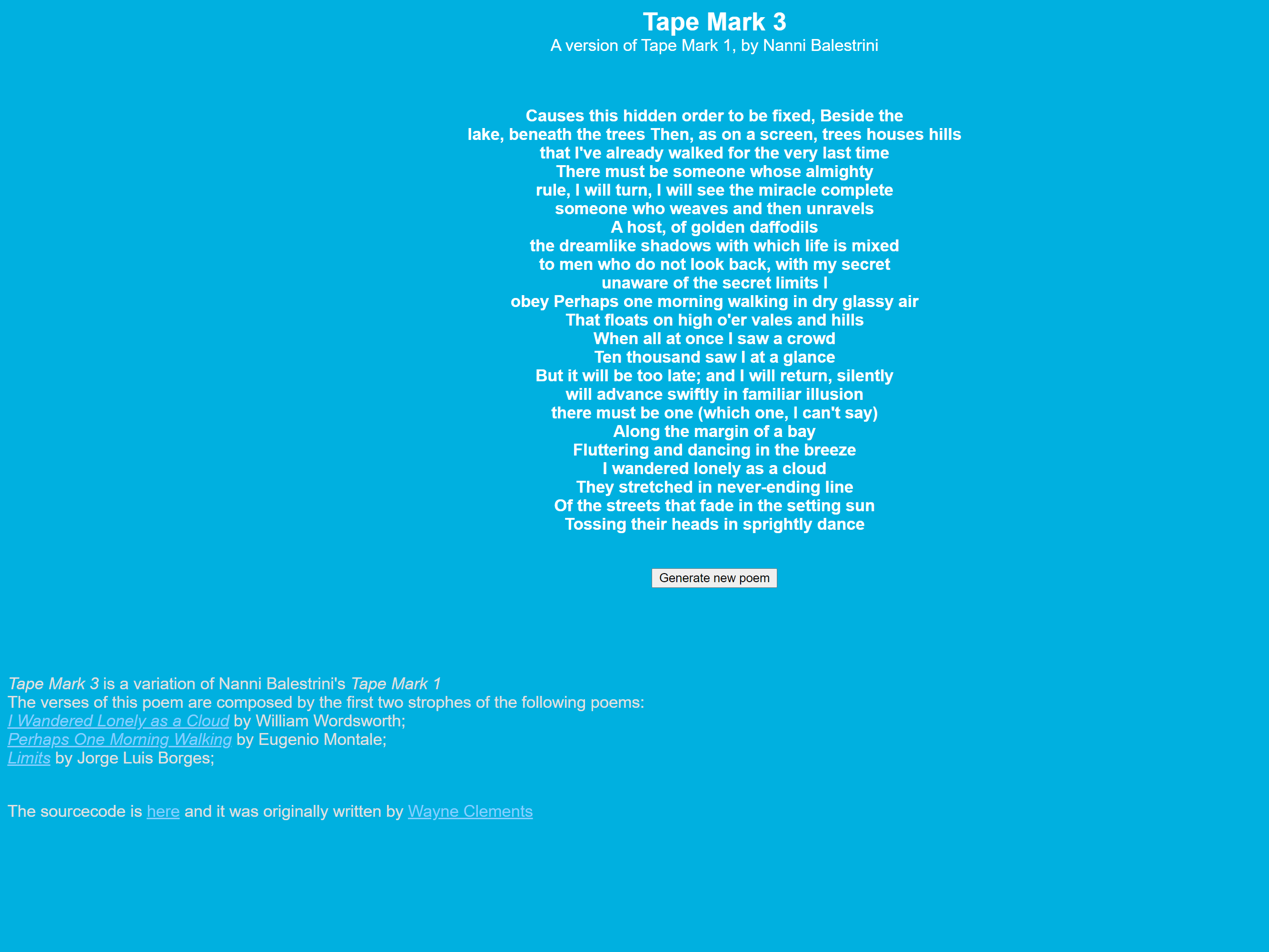Tape Mark 3
Daniele Giampà
“Tape Mark 3” is a variation of “Tape Mark 1” written by Nanni Balestrini in 1961. The original work is a generative combinatorial poem formed by solely three strophes of three different poems which are randomly and continuously rearranged by an algorithm generated by an IBM 7070 computer. Due to the progress of technology, this particular IBM system has become obsolete. For many years only the diagram for the algorithm was available.
“Tape Mark 3” is written in Perl Language and composed of the first two strophes of the following poems:
“I Wandered Lonely as a Cloud” by William Wordsworth;
“Perhaps One Morning Walking” by Eugenio Montale;
“Limits” by Jorge Luis Borges;
The three poems on which “Tape Mark 3” is based are thematically different - (following the example of the original poem - and are chosen without a specific reason, except for a few similarities of the content, i.e. a lonely man absorbed in his thoughts, walking and looking at nature - wherefore all verbs are expressed in 1st person singular - and the concept of limit and margin - thus creating a common theme in all possible variations of the poem.
The verses of these poems are arranged in a different order at every click on the button placed at the end of the composition. All versions of the poem consist of 23 verses and the code had to be changed accordingly. The most important modification was made by disabling some metacharacters in regular expressions to allow the flawless regeneration of the poem.
The original code was written by Wayne Clements to create a new version of “Tape Mark 1” using the same poems as Balestrini written in English. Both the code and the poem written by Clements are available on the author’s webpage . The code of "Tape Mark 3" is available on github.com/edgedpub.
“Tape Mark 3” follows the works of Nanni Balestrini and Clements and is distinguished by the number 3 in its title, because Balestrini published a book titled “Tape Mark 2” in 1963 in which he wrote similar poems using verses written by himself.
“Tape Mark 3” is a sample work for my practice-based PhD research study on the performative aesthetics of enhanced e-books proceeding from Johanna Drucker’s book “SpecLab: Digital Aesthetics and Projects in Speculative Computing” (2009). In “Tape Mark 3”, I demonstrate the interplay between programming language and natural language and how performative aesthetics is generated in the software program. Moreover, the poem is also an example of remediation and transcoding. Latter concept is to be understood as “translation between machine-readable code and human readable text, and also between codes of different programming languages and systems” as M. Portela, S. Pold and M. Mencía describe it in their essay “Electronic Literature Translation: Translation as Process, Experience and Mediation” (2018).
About the Artist
Daniele Giampà was born and raised in the city of Zürich (CH) where he attended Swiss obligatory school and Italian high school. At the age of 18, he started getting interested in humanistic studies and foreign languages. At the University of Zürich, he was mainly interested in finding a combination between philology and social sciences which eventually resulted in a research study of electronic literature in which he analysed the interplay of literature, linguistics and New Media. He graduated from University in 2013 with an MA in Italian and Spanish Philology and a Master thesis about electronic literature in Italy titled "Beyond the Boundaries of the Book. Italian Literature in the Digital Age".
From 2009-2012 he contributed as co-administrator to the online forum eLiterature & Net Art (2008-2012), in 2011 he launched his blog Electronic Literature Review and in 2014 he co-founded the research group Gruppo Giada (2014-2016). Since 2015 he has been working on the publication of interviews and essays and on the translation of seminal essays from English, German, Spanish and French into Italian to foster the divulgation, the analysis and the diffusion of electronic literature in Italy.
In 2015 he took his first course in the creation of e-books at the Italian software company Pubcoder and discovered his new passion for digital publishing. In 2018 he got a PhD position at the Kingston School of Art in London to undertake a practice-based research study on the aesthetics of enhanced e-books titled "Beyond the Boundaries of the E-book. Aesthetics of Post-digital Print".
In 2020 he founded EDGE DPUB a digital-first publishing house based in London.
